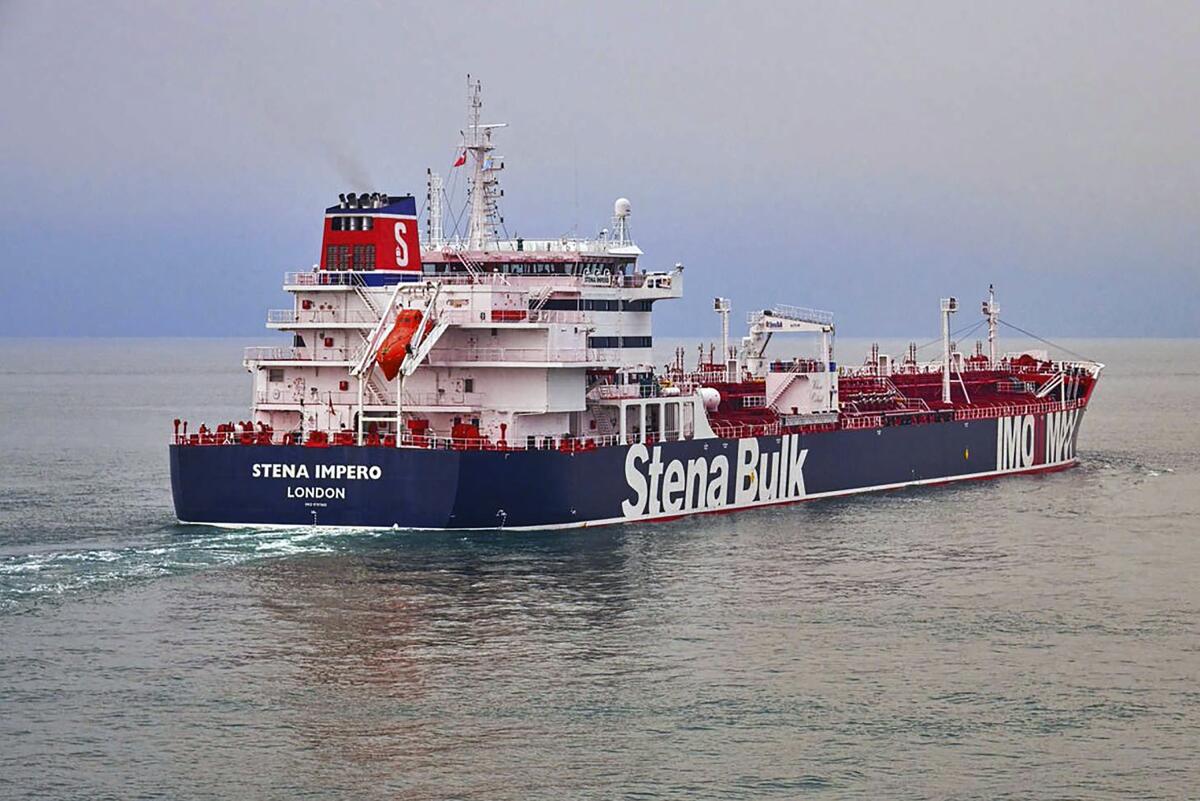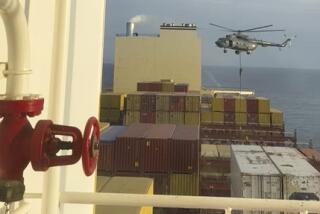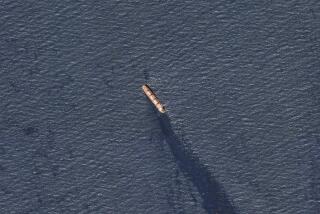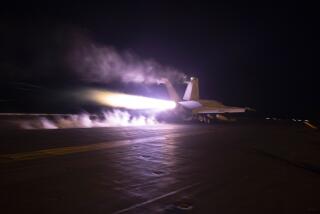Iran says it detained British tanker in Strait of Hormuz as a ‘reciprocal’ move

Iran’s detention of two British-owned oil tankers in the Strait of Hormuz sharply escalated tensions with London and Washington on Friday, increasing the odds that the two allies would undertake new military steps to protect shipping in the strategically important Middle East waterway.
Naval forces from Iran’s Islamic Revolutionary Guard Corps seized the British-flagged tanker Stena Impero, claiming it failed to follow international maritime regulations while transiting the strait, according to Iranian state media.
The tanker “was seized by the IRGC due to violating international regulations,” the Revolutionary Guard said in a statement. “After it was seized it was transferred to Iranian shores to undergo legal procedure.”
However, a powerful council in Iran said Saturday that the country seized the tanker in response to Britain’s role in impounding an Iranian supertanker in Gilbraltar two weeks earlier.
A spokesman for Iran’s Guardian Council, Abbas Ali Kadkhodaei, was quoted by the semi-official Fars news agency as saying “the rule of reciprocal action is well known in international law” and that Iran’s moves to “confront the illegitimate economic war and seizure of oil tankers is an instance of this rule and is based on international rights.”
The council rarely comments on state matters, but when it does it is seen as a reflection of the supreme leader Ayatollah Ali Khamenei’s views. That’s because the council works closely with Khamenei, who has final say on all state matters.
Another tanker was boarded by armed Iranian naval forces on Friday but later allowed to proceed, according to the Iranian news service FARS. The ship, named Mesdar, is Liberian-flagged but operated by Norbulk Shipping, a U.K.-based company.
The Iranian moves caused oil futures to surge and sharply raised fears in jittery markets that escalating back-and-forth actions by Tehran, Washington and London could threaten the flow of oil through the strait and possibly lead to military confrontation, as much as all sides appear to be trying to avoid one.
Officials in Washington and London held back from threatening military action to free the tanker Friday, and several senior officials said the U.S. would probably take its cue from Britain in deciding how to respond.
The British government, calling Iran’s actions “unacceptable,” said its response would be “considered and robust.” There will be “serious consequences if the situation is not resolved,” it said.
Britain’s Cabinet convened an emergency session in London to weigh options for securing the release of the Stena Impero, Foreign Secretary Jeremy Hunt said.
“I’m extremely concerned by the seizure of two naval vessels by Iranian authorities in the Strait of Hormuz,” Hunt said in a statement.
“We are working closely with international partners,” he added. “These seizures are unacceptable. It is essential that freedom of navigation is maintained and that all ships can move safely and freely in the region.”
The vessel’s owner said it had been seized in international waters while heading toward port in Saudi Arabia. “We are presently unable to contact the vessel, which is now heading north toward Iran,” the company said.
President Trump, speaking to reporters as he left the White House for a weekend trip to his golf club in New Jersey, noted that the U.S. has warships and other military forces in the region. But he seemed to play down the possibility of a military response, noting that the action was aimed at British, not U.S., vessels.
“We don’t have very many tankers going in, but we have a lot of ships there that are warships,” he said. “And we’ll talk to the U.K. And we have no written agreement, but we have an agreement. They’ve been a very great ally of ours.”
The U.S. has beefed up its military forces in the region in recent months, sending as many as 8,000 additional troops, along with warships and planes and other missile defense systems. For decades, the U.S. has vowed it would respond with military force if Iran attempted to close the strait, which serves as a crucial passageway for much of the oil from Gulf states.
At a minimum, the U.S. is likely to use the incidents in pressing allies to send more naval vessels to the region to protect tankers transiting the strait. U.S. officials have had little success recently in putting together an international coalition to do that, in large part because of strain between Washington and its allies over Trump’s decision to pull out of the 2015 agreement that curbed Iran’s nuclear program.
At the Pentagon, a senior official said it was “too early to tell” whether Trump would order a U.S. military response, noting that it was likely to depend on how long Tehran held the British vessel and a decision by British officials about how they want to respond.
A spokesman for U.S. Central Command said the U.S. has “patrol aircraft operating in international airspace monitoring the situation within the Strait of Hormuz.”
“U.S. Naval Forces Central Command has been in contact with U.S. ships operating in the area to ensure their safety,” said the spokesman, Lt. Col. Earl Brown.
At its narrowest the strait measures 21 nautical miles, yet in 2016 some 18.5 million barrels of oil passed through it per day, according to the U.S. Energy Information Administration.
The Iranian moves against the two tankers came a day after the U.S. said it downed an Iranian drone that had approached a U.S. Navy ship as it transited the strait. Two weeks earlier, British marines seized an Iranian tanker off the British territory of Gibraltar, claiming the ship was carrying oil to Syria in violation of international sanctions.
In recent days, Iranian officials had warned there would be retaliation for Britain’s seizure of the 1,000-foot supertanker, Grace 1.
“Iran will respond to the vicious Britain’s piracy,” supreme leader Ayatollah Ali Khamenei, the country’s top religious authority, said in a speech earlier this week.
The official Islamic Republic News Agency quoted an unnamed military official on Friday who said the Stena Impero had been in the wrong lane in the strait. The ship’s crew had also turned off its tracker and did not respond to signals, the official said.
Ships broadcast their location via the Automatic Identification Systems using on-board transponders. The information is used alongside maritime radar to avoid collisions, a major concern in the narrow strait. Ships are supposed to use one of two shipping lanes, each of which is two miles wide, separated by a two-mile buffer zone.
Ships generally keep transponders active when going through the strait. But vessels have been known to turn their transponders off, especially when engaging in sanctions-breaking oil transportation but also during times of increased security concerns, experts said.
The latest incidents came after months of escalating tension with Iran during which the U.S. blamed Tehran for multiple attacks that damaged Western oil tankers near the strait and the downing of a U.S. surveillance drone over the strait.
Iranian officials pointedly warned in April, after the Trump administration tightened a ban on Iran’s oil exports and worsened its economic recession, that they had the ability to halt the flow of oil through the narrow strait in response.
“They want to demonstrate that they can hit any traffic going through the Gulf at any time. That has the benefit of spooking not just the Trump administration but also other key stakeholders to the nuclear agreement and also their neighbors,” said Suzanne Maloney, who worked on Iran policy in President George W. Bush’s State Department and advised the Obama administration.
Many leaders in Europe and Asia remain angry over Trump’s decision to withdraw last year from the Iran nuclear deal, signed in 2015 by the Obama administration, Russia, China, France, Germany, Britain and Iran. Under the agreement, Tehran dismantled most of its nuclear production infrastructure and admitted international inspectors.
Trump has been seeking to pressure Iranian officials to reopen negotiations on its nuclear program and other issues, but his overtures have been largely rebuffed.
Trump backed away from military action against Iran in June after the downing of the U.S. drone and could do so again in hopes of avoiding a military confrontation and keeping alive the possibility of a diplomatic stand-down, officials said.
Mara Karlin, a senior Pentagon official during the Obama administration, said the situation is unpredictable on both sides, making a response hard to predict and risky.
“Is this a thoughtful, balanced use of carrots and sticks, or is this kind of strategic flailing?” she said of Iran, pointing to the recent overtures to reopen negotiations.
Trump is also unpredictable, she noted.
His decision not to retaliate for the downing of the drone “demonstrated that Trump was willing to get this close to attacking Iran with military force and then that he quickly backed off,” she said. “It only spurred profound confusion.”
A decision about possible U.S.-British joint action is likely to come only after British officials attempt to secure the release of the Stena Impero and its crew, Maloney said.
“The first order of business is to try to ascertain the safety and security of the crew … to try to extricate them from the situation,” she said. “Planning beyond that is going to be deferred and distracted.”
The crew’s fate is likely to be linked to a decision in Gibraltrar about the seized Iranian tanker and its crew.
On Friday, Gibraltar’s Supreme Court ruled that the ship could be held for 30 additional days. Hunt, the British foreign secretary, has said Britain would “facilitate the release” of the tanker if Tehran promised it would not travel on to Syria in violation of sanctions.
Cloud and Bierman reported from Washington and Bulos from Beirut. Special correspondents Christina Boyle in London and Ramin Mostaghim in Tehran contributed to this report. The Associated Press also contributed to this report.
More to Read
Start your day right
Sign up for Essential California for news, features and recommendations from the L.A. Times and beyond in your inbox six days a week.
You may occasionally receive promotional content from the Los Angeles Times.








